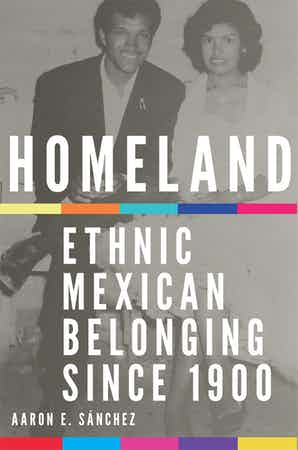Aaron E. Sánchez
Email: aaron.e.sanchez@ttu.edu
Ph.D., Southern Methodist University
Aaron E. Sánchez is an intellectual and cultural historian of the U.S. Southwest,
with a focus on the Chicana/o/x and Latina/o/x communities in the region. His monograph
Homeland: Ethnic Mexican Belonging Since 1900 (University of Oklahoma Press, 2021) is a transnational interdisciplinary history
of ethnic Mexican belonging that sits at the intersection of intellectual, cultural,
and literary history. Through poetry, manifestos, novels, policy, and other sources,
it shows how ethnic Mexicans deconstructed and reconstructed the “ideological architecture
of human interconnectedness” in a century when the imaginative bonds that connected
communities and individuals were being broken and remade across the world.
Sánchez’s dissertation won the 2014 National Association for Chicana and Chicano Studies Tejas Foco Dissertation Award, a national award for best dissertation in Chicana/o studies on Texas. His research and reviews have been published in the Journal of the West, Aztlán: A Journal of Chicano Studies, the Pacific Historical Review, the Journal of the South, and others.
His current project, Elefantes in the Room: Mexican American Civil Rights Social Conservatism in the Twentieth Century and Beyond, explores modern Mexican American conservatism in the U.S. It will outline the development of “civil rights social conservatism,” a set of ideas that limited critiques of central institutions in American society in hopes of inclusion. Civil rights social conservatism influenced early groups like Order Sons of America, LULAC, and the American GI Forum until it was unhinged from civil rights during the Chicana/o Movement. It was found in the politics of “Brown capitalism” that transformed institutions like the Mexican American Unity Council (San Antonio), Chicanos Por la Causa (Tucson), and the East Los Angeles Community Union (LA). It was even found in the essays and politics of Richard Rodriguez. Civil rights social conservatism eventually found a ready home in the remaking of the conservative coalition that would define American politics in the post-1970s era.
In addition to his academic publications, Sánchez has written extensively for popular audiences, providing historical context and perspective on contemporary issues through a Latinx lens. His op-eds, essays, and articles have appeared in nationally acclaimed journalistic outlets like the Washington Post, Latino USA, NPR’s Code Switch, Sojourners, Latino Rebels and the Texas Observer, among others. He was awarded the 2019 Award of Excellence from the ACP for best monthly column for his writing in Sojourners.
Apart from being a professor and a writer, he is a happy husband, a proud father, an avid runner, and a dog-lover.

Select Publications

Homeland: Ethnic Mexican Belonging Since 1900
Ideas defer to no border—least of all the idea of belonging. So where does one belong,
and what does belonging even mean, when a border inscribes one’s identity? This dilemma,
so critical to the ethnic Mexican community, is at the heart of Homeland, an intellectual, cultural, and literary history of belonging in ethnic Mexican thought
through the twentieth century.
Belonging, as Aaron E. Sánchez’s sees it, is an interwoven collection of ideas that
defines human connectedness and that shapes the contours of human responsibilities
and our obligations to one another. In Homeland, Sánchez traces these ideas of belonging to their global, national, and local origins,
and shows how they have transformed over time.
For pragmatic, ideological, and political reasons, ethnic Mexicans have adapted, adopted,
and abandoned ideas about belonging as shifting conceptions of citizenship disrupted
old and new ways of thinking about roots and shared identity around the globe. From
the Mexican Revolution to the Chicano Movement, in Texas and across the nation, journalists,
poets, lawyers, labor activists, and people from all walks of life have reworked or
rejected citizenship as a concept that explained the responsibilities of people to
the state and to one another. A wealth of sources—poems, plays, protests, editorials,
and manifestos—demonstrate how ethnic Mexicans responded to changes in the legitimate
means of belonging in the twentieth century. With competing ideas from both sides
of the border they expressed how they viewed their position in the region, the nation,
and the world—in ways that sometimes united and often divided the community.
A transnational history that reveals how ideas move across borders and between communities,
Homeland offers welcome insight into the defining and changing concept of belonging in relation
to citizenship. In the process, the book marks another step in a promising new direction
for Mexican American intellectual history.
Department of History
-
Address
Texas Tech University, Box 41013, 3001 15th Street, Humanities (formerly English/Philosophy) 165, Lubbock, TX 79409 -
Phone
806.742.3744 | Fax: 806.742.1060 -
Email
info.history@ttu.edu
